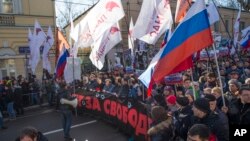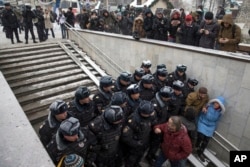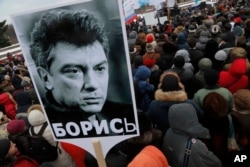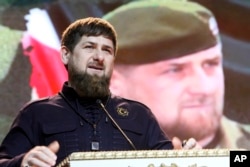Since Vladimir Putin’s returned to the Kremlin in 2012, Russians have experienced a large-scale attack on freedom of speech and assembly. That is the conclusion of a group of experts who met this week in Washington to discuss the human rights situation in Russia.
According to conference participants, since Putin returned to the Russian presidency after serving a term as prime minister, authorities have severely cracked down on opposition activists, labeling them “traitors” and members of a “fifth column.” Non-governmental organizations also have been persecuted, with Russia’s parliament adopting special laws targeting so-called “foreign agents” and “undesirable organizations.”
Paula Dobriansky served as U.S. Under Secretary of State for Democracy and Global Affairs from 2001 to 2009. She is currently a senior fellow at the Belfer Center for Science and International Affairs at Harvard University’s John F. Kennedy School of Government.
She told Wednesday’s conference that the Putin administration’s wave of repression is, on one level, hard to explain, given that he remains very popular, at least according to Russian polls.
Dobriansky suggested Putin’s high popularity rating masks the actual “fragility” of his hold on power.
“We know that economically, that Russia is facing a lot of economic strains. Capital flight is very substantial over the last several years," said Dobriansky. "The ruble has halved [in value]. There’s been no modernization economically, and we know that oil prices have dropped, of which Russia’s economy is predominantly dependent on.”
According to its critics, the Kremlin decided to try to preempt the kind of mass protests that often accompany an economic crisis, and a wave of blackmail, intimidation and direct and indirect threats against its political opponents has followed. In such an atmosphere of fear and hatred, not everyone can find the strength to speak out against the government.
Wednesday's conference took place just a few days after the first anniversary of the assassination of Boris Nemtsov, the former Russian deputy prime minister and leading Putin opponent who was shot to death just steps away from the Kremlin on February 27, 2015.
Five suspects were arrested in connection with Nemtsov's murder, including Zaur Dadayev, a former officer in a security battalion loyal to Ramzan Kadyrov, Chechnya’s Kremlin backed leader and one of Putin’s most vocal supporters.
Following Dadayev’s arrest, Kadyrov called him a "true patriot" of Russia.
Participants in Wednesday’s conference also called attention to an incident last month, when Kadyrov released a video on social media that appeared to depict two other leading Russian opposition figures, former prime minister Mikhail Kasyanov and Vladimir Kara-Murza Jr., in the crosshairs of a sniper rifle's scope.
U.S. Deputy Assistant Secretary of State Robert Berschinski told the conference that 2015 was “one of the darkest years in recent Russian history, and 2016 is off to no better a start.’’
“The climate of impunity in the country has only deepened. The organizers of the Nemtsov murder remain at large and unprosecuted," Berschinski said. "And as we just heard, other activists are also in the crosshairs – literally, in some cases, but only thus far digitally. And yet not one word of condemnation has come forward from the Russian government. Those who have been targeted know, and we know, what ultimately has been put in the crosshairs – the Russia that Boris Nemtsov devoted his life to support: a Russia strong enough to respect the rights of its own citizens and to uphold the norms of international behavior.”
Carl Gershman, president of the Washington-based National Endowment for Democracy, told the conference that Chechnya’s Kadyrov represents “the most extreme, lawless and violent component of the campaign of repression.”
“Kadyrov has been involved in the murder of many prominent Russian democrats, including the great journalist Anna Politkovskaya and human rights defender Natalia Estemirova," said Gershman. "Nemtsov’s murder, for which there is also considerable evidence also pointing to Kadyrov’s complicity, represented a wholly new level of intimidation against the opposition: the assassination, directly in front of the Kremlin, of a former high-ranking government minister, who at the time was one of Russia’s most prominent opposition figures.”
Still, Gershman said, the opposition has refused to be intimidated: on the anniversary of Nemtsov’s murder, the slain opposition activist’s colleague Ilya Yashin published an exposé of Kadyrov’s activities and the Kremlin’s support for him, titled “A Threat to National Security.”
“I am humbled and amazed by the courage of these Russian democrats,” Gershman said.
“Last May 26, just weeks after he spoke in the U.S. Congress at a symposium memorializing his friend Boris Nemtsov, Vladimir Kara-Murza (Jr.) suffered a severe poisoning that resulted in multiple organ failures and a coma that nearly led to his death. Miraculously, he survived: doctors had only given him a 5 percent chance to live. And he has now returned to Russia to continue his work for freedom, democracy and human rights," said Gershman.
The courage of Russia’s democratic opposition, Gershman said, inspires optimism for the country's future.












